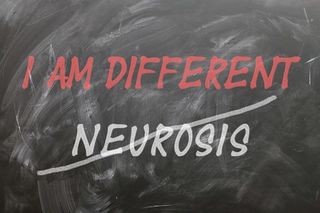Anxiety
Science Says: Being Different Doesn’t Mean You’re Weird
Researchers propose that seemingly abnormal variables in behavior may be normal.
Posted February 28, 2018

Social conformity, or adapting to and acting like those around us, can make certain behaviors seem more common, and therefore more normal, but all it really means is we are able to adjust our moral compass in order to acclimate and fit in. We don’t want to seem weird or abnormal. But according to clinical psychologist Avram Holmes of Yale University, abnormal behavior isn’t necessarily weird or bad or indicative of mental illness, because there is no absolute definition of normal and no single best way to behave.
In a review article published in the February 20th issue of the journal Trends in Cognitive Sciences, Holmes proposes that there are variations in all human traits and, depending on the circumstances, there can be both positive and negative manifestations associated with any trait. Which way it goes depends on many factors, Holmes research indicates, including the context or the individual circumstances of a person’s life.
Popular ways of thinking and behaving aren’t necessarily ethical, or right, or better than others, just because, at times, it seems like “everybody’s doing it” or “everybody’s saying it.” And at the same time, not all behavior that varies from the norm is indicative of a mental disease or disorder. Human variability is important, Holmes points out because there are times when both positive and negative traits serve an important purpose. For instance, variations within the region of the brain that controls inhibition can result in sensation-seeking or compulsive behavior in the forms of addiction, criminality, hypersexuality or abuse, but they can also manifest as more positive behaviors, such as an increased motivation to exercise or a high degree of social or reproductive success.
Holmes’ research reveals that anxiety is another good example of a condition that can work for or against us, depending on the situation. While an anxiety-ridden individual might have a harder time than most people in personal relationships and social situations, the same trait can provide more motivation to strive for success in school or work, and even preserve one’s life because of a tendency toward caution that results in fewer accidents.
The question remains: When do abnormal traits and behavior reflect a psychological disorder? The answer is complex but, for a start, Holmes points out, it’s important not to view oneself or others in terms of a specific good or bad trait, and not to strive for one type of homogenized, ideal behavior, but instead understand the relevance and importance of human variability. The answer to the question, Holmes research suggests, lies not only in recognizing existing psychological, neurological and genetic conditions, but also the environmental context. Abnormal variations can lead to success when individuals find themselves in situations conducive to the way their brain functions.
References
Holmes AJ and Patrick LM. The myth of optimality in clinical neuroscience. Trends in Cognitive Sciences. March 2018;22(3):241-257.
http://www.cell.com/trends/cognitive-sciences/fulltext/S1364-6613(17)30…
Lindstrom B, Jangard S, Selbing I, Olsson A. The role of a “common is moral” heuristic in the stability and change of moral norms. Journal of Experimental Psychology: General. February 2018;147(2):228-242


